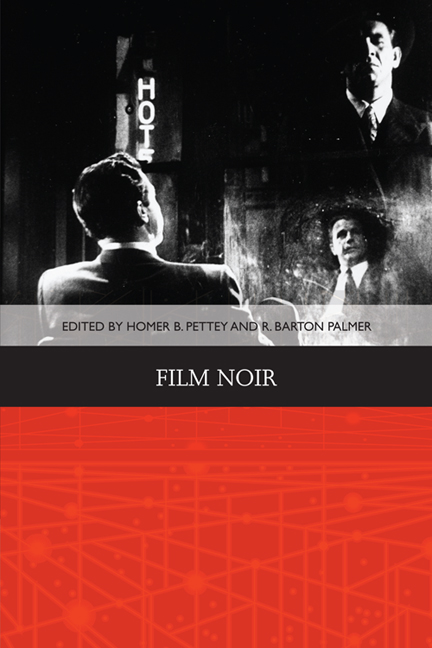Book contents
- Frontmatter
- Contents
- List of Illustrations
- Acknowledgements
- Notes on the Contributors
- Introduction: The Noir Turn
- 1 The Cinema of Uncertainty and the Opacity of Information from Louis Feuillade's Crime Serials to Film Noir
- 2 Warning Shadows: German Expressionism and American Film Noir
- 3 Hard-boiled Tradition and Early Film Noir
- 4 Cold War Noir
- 5 Noiring the Pitch: The Conflicted Soundtracks of Out of the Past, The Blue Gardenia and The Long Goodbye
- 6 Split Screen: Sound/Music in The Stranger/Criss Cross
- 7 Gender and Noir
- 8 The Subversive Shade of Black in Film Noir
- Postscript: A History of Our Writing about Film Noir
- Selected Book Chapters on Film Noir
- Selected Film Noir Books
- Selected Guide to Film Noir
- Index
5 - Noiring the Pitch: The Conflicted Soundtracks of Out of the Past, The Blue Gardenia and The Long Goodbye
Published online by Cambridge University Press: 05 August 2016
- Frontmatter
- Contents
- List of Illustrations
- Acknowledgements
- Notes on the Contributors
- Introduction: The Noir Turn
- 1 The Cinema of Uncertainty and the Opacity of Information from Louis Feuillade's Crime Serials to Film Noir
- 2 Warning Shadows: German Expressionism and American Film Noir
- 3 Hard-boiled Tradition and Early Film Noir
- 4 Cold War Noir
- 5 Noiring the Pitch: The Conflicted Soundtracks of Out of the Past, The Blue Gardenia and The Long Goodbye
- 6 Split Screen: Sound/Music in The Stranger/Criss Cross
- 7 Gender and Noir
- 8 The Subversive Shade of Black in Film Noir
- Postscript: A History of Our Writing about Film Noir
- Selected Book Chapters on Film Noir
- Selected Film Noir Books
- Selected Guide to Film Noir
- Index
Summary
In Jacques Tourneur's Out of the Past (1947) and Fritz Lang's The Blue Gardenia (1953), a romantic ballad plays over the opening credits and recurs regularly as it becomes associated with the central characters, but is not heard at the end of the film. Although the scores for both films are otherwise entirely typical of Classical Hollywood, a vanishing love song is unusual. On one hand, the phasing out of a love theme seems well-suited to film noir if only because so many noirs begin with the promise of romance before descending into negativity. I cannot, on the other hand, locate any films from the ‘official’ years of noir besides Out of the Past and The Blue Gardenia in which a love song is heard at the beginning but not at the end. Regardless of whether or not these two films are unique in their use of love songs, it is significant that in both films the songs are introduced diegetically by African-American musicians. The songs may disappear from the films because they are associated at the outset with otherness.
We need to go beyond the years of classic noir – usually designated 1942 to 1959 – to find another example of a disappearing love song. Long after Orson Welles drove a stake through the heart of film noir with the perverse revisionism of Touch of Evil, Robert Altman revised the Hollywood love song even more perversely with The Long Goodbye (1973). Altman commissioned no less than John Williams and Johnny Mercer to write the song ‘The Long Goodbye’ for his film. The song is heard repeatedly throughout the film, often popping up in extremely unlikely places. But at no time does the audience hear the entire song, either with or without Mercer's lyrics. And instead of hearing the song at the end of the film, we hear an ancient recording of ‘Hooray for Hollywood’. Altman was not merely revising the genre of hard-boiled noir in particular and Hollywood cinema in general. He was also asking audiences to contemplate how popular songs drift in and out of movies and how that music may or may not affect the rest of the film.
- Type
- Chapter
- Information
- Film Noir , pp. 103 - 121Publisher: Edinburgh University PressPrint publication year: 2014



